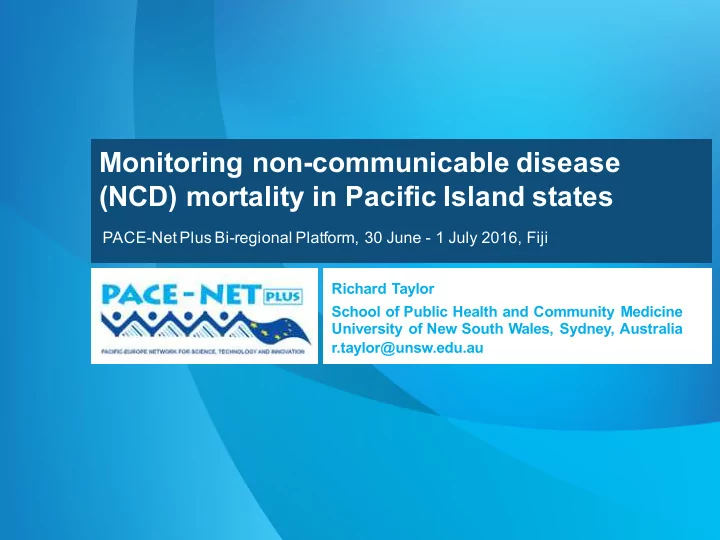

Monitoring non-communicable disease (NCD) mortality in Pacific Island states PACE-Net Plus Bi-regional Platform, 30 June - 1 July 2016, Fiji Richard Taylor School of Public Health and Community Medicine University of New South Wales, Sydney, Australia r.taylor@unsw.edu.au
Monitoring non-communicable disease (NCD) mortality in Pacific Island states Richard Taylor r.taylor@unsw.edu.au I. Background and Objectives Background. Many Pacific Island states are affected by morbidity (illness) and excess premature adult mortality with plateaux in life expectancy (demographic effects) from NCD Including heart disease and stroke, diabetes, cancer, and chronic lung disease Due to change in diet and nutrition ( increase in intake of animal fat, salt, and energy ), tobacco and alcohol consumption, and less physical activity Which are preventable through population health promotion to modify behaviours, and alteration of cost and availability of unhealthy products; and individual health service interventions NCD surveillance measures magnitude/distribution of health effects, and effectiveness of interventions: 1. population surveys NCD/risk factors ; 2. trends in level/cause of NCD mortality Objectives. 1.Allleviate difficulties in Pacific Island states in monitoring trends in NCD cause of premature death by analysis of current difficulties in certification, coding, tabulation, and analysis 2. Evaluate innovative tools and analyses as applied to available incomplete, disrupted and dislocated cause of death data affected by considerable selection and measurement biases 3. Pilot innovative analyses using IRIS software for semi-automated coding and selection of underlying cause of death to produce more accurate and usable NCD cause of death trends in the short and medium term to inform public heath and health promotion policy PACE-Net Plus is a project funded by the European Commission to reinforce EU-Pacific cooperation on Science, Technology & Innovation, and to 2 promote the development of mutually beneficial partnerships. Grant agreement n° 609490.
Monitoring non-communicable disease (NCD) mortality in Pacific Island states Richard Taylor r.taylor@unsw.edu.au I. Outcomes A: Networking Multilateral international meetings Review of existing situations in Pacific states 1. School of Public Health and Community Medicine SPHCM UNSW Sydney Australia. 24 Nov 2015 Contacts present: Fiji Ministry of Health (MoH), Samoa MoH, Tonga MoH, SPHCM UNSW 4. Total 7 2. Institute de Recherche pour Développement IRD Nouméa Nouvelle Calédonie (NC). 3 Dec 2015 Contacts present: NC: UNC 1, DASS 1, CHT 2; Vanuatu MoH 1; SPHCM UNSW 2; SPC 2. Total 9 Bilateral international netwroking (continuing). Intensive cause of death analyses on de-identified death certificate data (containing all causes of death on the certificate) provided confidentially. Fiji: Analysis of 25,116 deaths 2007-2010 (complete) containing listed causes of death (coded) in sequence in Part I and Part II of death certificate to produce underlying cause of death (multiple cause analysis) Samoa: Analysis of 2,666 death certificates (text) and 673 deaths in Apia hospital (coded) from 2011-13 using available incomplete samples of deaths. Tonga: Analysis of cause of death 2,500 deaths from 2010-14 after deduplication; to be extended to 2000. Full network of contacts Fiji: MoH Health information Unit, Fiji National University (Medicine, etc). Samoa MoH. Tonga MoH. Vanuatu MoH. New Caledonia: UNC, DASS, CHT. France: INSERM / UPMC. UK: LSHTM. Australia: SPHCM UNSW PACE-Net Plus is a project funded by the European Commission to reinforce EU-Pacific cooperation on Science, Technology & Innovation, and to 3 promote the development of mutually beneficial partnerships. Grant agreement n° 609490.
Monitoring non-communicable disease (NCD) mortality in Pacific Island states Richard Taylor r.taylor@unsw.edu.au I. Outcomes A: Deliverables (1) Evaluation of successes/challenges of pilot analysis of NCD cause of death data from 3 Pacific Island countries: Fiji, Samoa, Tonga Assessment of difficulties in: death registration, certification of cause of death, coding, data entry, selection of underlying cause of death, tabulation of deaths by cause, display of results, reporting (2) Development of programed spreadsheets for analysis of mortality data to produce: Age-standardised total mortality, probability of dying (over age intervals) and life tables from tabulated total deaths and populations (with 95% confidence intervals) Cause specific proportional mortality and age-standardised mortality from tabulated cause specific deaths and populations (with 95% confidence intervals) https://sphcm.med.unsw.edu.au/centres-units/international-ncd-research-group/downloads These spreadsheets have been extensively used in training courses and by personnel in Pacific Island states for preparation of reports (3) Use of IRIS semi-automated coding of causes of death from text from death certificates, and semi-automated selection of underlying cause of death from coded causes of death These analyses were undertaken on cause of death data from Fiji, Samoa and Tonga with the development of algorithms for alternative scenarios for selection of underlying cause of death , in a multiple cause of death context. Results discussed with Pacific contacts, analyses continue PACE-Net Plus is a project funded by the European Commission to reinforce EU-Pacific cooperation on Science, Technology & Innovation, and to 4 promote the development of mutually beneficial partnerships. Grant agreement n° 609490.
Recommend
More recommend